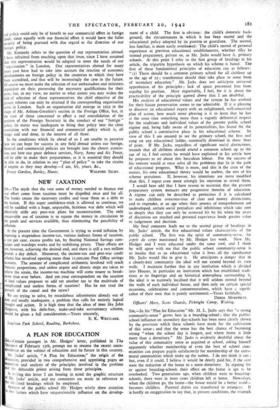A PLAN FOR , EDUCATION Slif--Certain passages in Mr. Hodges' letter,
published in The spectator of February 13th, prompt me to resume the recent corre- sPondence on the subject of education and its future in this country. Mr. Jacks' article, " A Plan for Education," the origin of the scussion, provided in two comprehensive and appetising pages an Position and analysis of the principles involved in the problem d the debatable pdints arising from these principles.
In writing this letter I am bearing in mind the graphic structure Mr. Jacks' article, and my comments are made in reference to tabulated headings which he employed. Apropos of the public school Mr: Hodges wisely drew attention two factors which have unquestionable influence on the develop-
ment of a child The first is obvious: the child's domestic back- ground, the circumstances in which it has been reared and the educational policy adopted by its parents or guardians. The second, less familiar, is more easily overlooked: The child's record of personal experience at previous educational establishments, whether they be termed preparatory, private or, as Mr. Jacks would have it, primary schools. At this point I refer to the first group of headings in his article, the tripartite hypothesis on which his scheme is based. The first of these fundaniental principles of education ran as follows: " (a) There should be a common primary school for all children up to the age of 12; transference should then take place to some form of secondary education." Mr. jacks does not anticipate universal approbation of his principles ; lack of space prevented him from arguing his position. Most regrettably, I feel, for it is about the practicability of the principle quoted above that I am doubtful.
His analysis of educational values and the system he has evolved for their future preservation seems to me -admirable. If it is pleasing to discover an educational expert with an enlightened, well-conceived plan of action, how much more pleasing is it to learn that he has at the same time something more than a vaguely deferential respect for the traditions and individual values of the present public school regime and, being fully aware of its potentialities, has found for the public school a constructive place in his educational scheme. In view of this I am amazed to see the primary school, the first real rung on any educational ladder, summarily dismissed in three lines of print. If Mr. Jacks, regardless of significant social distinctions, intends that all children should attend a common school up to the age of 1z, I feel certain he would have explained in his article how he proposes to set about this herculean labour. For the success of his venture would at once solve all the problems that lie in the path of educational progress. What is more, and this is the crux of the matter, his own educational theory would be useless, the rest of his scheme gratuitous. If, however, his intentions are more modified than this, I regret even more strongly his omission to reveal them. I would here add that I have reason to maintain that the present preparatory system menaces any progressive theories of education. A regime can only be described as pernicious if it is calculated to make children overconscious of class and money distinctions, and to engender, at an age. when their powers of comprehension are undeveloped, certain social prejudices and inhibitions which take root so deeply that they can only be removed bit by bit when the years of discretion are reached and personal experience lends greater value to judgement and decision.
My final comment leads me to the second group of headings in Mr. Jacks' article, the five educational values characteristic of the public school. The first was the spirit of community-sense, the esprit de corps mentioned by Mr. Hodges last week. Now Mr. Hodges and I were educated under the same roof, and I think he will agree with me that the public school community-sense is so insular that as an educational value it loses all the significance Mr. Jacks would like to give it. He anticipates a danger that in a closely-knit community the ideal will not extend beyond its own walls. I maintain further that in any institution which is divided into Houses, in particular an institution which has established tradi- tions at its fingertips and an historical atmosphere surrounding it, the ideal is so narrowly localised that it will seldom extend beyond the walls of each individual house, and then only on certain special occasions, celebrations and commemorations, which have a signifi- cahce of their own that is purely sentimental.—Yours faithfully,


























 Previous page
Previous page